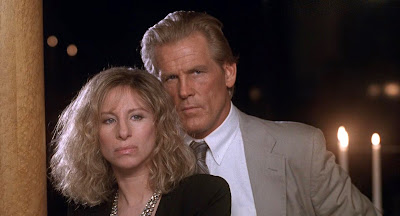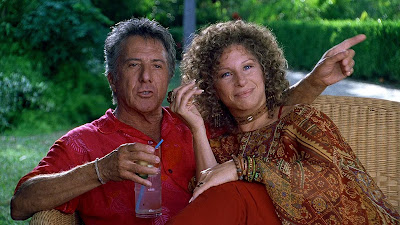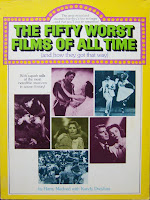My family moved around a lot when I was young, so new cities and new schools were a commonplace part of my upbringing. But commonplace doesn't mean easy. Having to always adapt to new people and new surroundings contributed to my being a very quiet and shy young man who kept to himself and didn't make friends easily.
At home, I retreated into watching movies on TV. But during lunch hours, after school, and on weekends (when I wasn't sitting for hours in a darkened movie house) I haunted the bookstalls at the local library. For as long as I can remember I've loved reading books about Hollywood, filmmaking, and the movie industry. So much so that in every public library in each new city and at every used and new bookstore in each town, my first question of inquiry was always: "Where's your film section?" - and there I'd literally spend hours engrossed in a world which seemed as distant and fantastic as any sci-fi adventure or futuristic fantasy.
My love of reading about film continues to this day, my home bookcases bulging with so many volumes it looks like the film reference section of a research library (I can't really get into e-books - I still like the heft and feel of hardcover).
At the request of a reader of this blog, I thought I'd list a few of my favorite Hollywood/film-related books. Not a comprehensive list by a long shot, and not a list intended to be taken as "recommended reading." Merely a few of the titles that come fondly to mind when asked about film-related books I've enjoyed over the years. (The one restriction I've applied is that I've limited my list exclusively to books I own.)
Since my partner shares my love of exploring the few used bookstores still in existence in the LA area, I'm hoping some of you might perhaps share the names of some of your favorite movie-centric tomes. One never can tell what gems will be unearthed!
The Nashville Chronicles: The Making of Robert Altman’s
Masterpiece by Jan Stuart / 2000 — Since it looks like the once-proposed 10-hour miniseries version of
Nashville that ABC-TV was at one time interested in broadcasting will never see the light of day (made up of all the unused footage from Robert Altman's 1975 opus), this impressively comprehensive behind-the-scenes account of the making of one of my favorite films is an invaluable substitute. A vision of personal filmmaking I can only imagine is long gone in this day of the corporate franchise.

Hitchcock -Truffaut by François Truffaut Francois Truffaut / 1966 — I have yet to see the 2015 documentary based on the legendary eight-day interview French director François Truffaut had with Alfred Hitchcock in 1962, but when I read this book in 1970, it was my very first in-depth glimpse into what had heretofore been something we regular folks could only guess at: the job of the director. I know I said none of the books on my list could be called "recommended reading," but if you love film at all, I'd call this book mandatory reading.

Ever, Dirk: The Bogarde Letters Edited by John Coldstream / 2008 — Academic film study is all well and good for understanding the nuts-and-bolts side of filmmaking; but nothing beats a book where a celebrity lets their hair down and exposes the mundanity behind the art. This massive collection of letters written by actor Dirk Bogarde between 1969 and 1999 (a period when he eased into becoming an author of six novels and eight guarded autobiographies) is enjoyable in direct proportion to your fondness for the actor (I adore him) and love of casual bitchery ( I plead the Fifth). Bogarde refers to Glenda Jackson as "Tits Jackson," thinks Michael Caine has "the ugliest voice in the business," and had this to say about the stars of 1976s Logan's Run: "...even (Tyrone) Power was better than the homogenized sexlessness of (Michael) York or Fawcett Major...she sounds like a Public School or some village in green Wilshire. Is she?"

For Keeps by Pauline Kael / 1994 — Perhaps because there were so many films I wanted to see that I wasn't allowed to, when I was young, I developed a passion for reading film criticism. I pored over collections of the writings of Stanley Kauffmann and John Simon, but I credit Pauline Kael exclusively with really teaching me how to look at movies and for introducing me to the still-revolutionary notion that we don't love a film because it's "good"; we love a film because it speaks to us. Happily, I've been able to find her earlier books on eBay, but this career collection, comprising more than 275 of her reviews and essays, is pure bliss. Even when she goes off in directions I don't agree with, I always relate to her passion and way with words.

Edge of Midnight: The Life of John Schlesinger by William J. Mann / 2005
— The life and career of the magnificent director of
Darling,
Midnight Cowboy, and
The Day of the Locust are examined in this thorough and thoroughly engaging biography written with the participation and co-operation of Schlesinger himself. Outrageously informative and insightful in its conveyance of artistic genius in a modest man who rarely saw himself as a trailblazer and creator of some of the most enduring works in cinema.
 The Busby Berkeley Book
The Busby Berkeley Book by Tony Thomas / 1973
— The occasion of my getting this book is a particularly happy memory, as it was an early 16th birthday present from one of the rare occasions in my mid-teens when the entire family went to the movies together. The film was Neil Simon's
The Heartbreak Kid, and it was playing on Polk Street in San Francisco at the Royal Theater. The line for the movie was long, so we were stalled for some time in front of a bookstore called "Rooks and Becords" on the corner.
The Busby Berkeley Book was part of the store's window display, and I had been chattering away to one of my sisters about how, after seeing Ken Russell's The Boy Friend (1971), I had become such a fan of Berkeley's movies. So caught up in the topic, I didn't pay much heed when my mom sent my eldest sister off to check on our parking meter. As it turns, out, my mom actually gave my sister money to go into the bookstore to purchase this book. A book I vocally lusted after, but which seemed too grand and costly a purchase (a whopping $15) to seriously entertain.
As any adolescent is likely to attest; when a parent gives even the slightest sign of knowing what is of importance to their child, it feels like the most extravagantly heartwarming acknowledgment and validation. I've never forgotten the way this terribly sweet gesture made me feel that day, and I forever associate my mom (an avid reader) with instilling in me a love of books.
The Busby Berkeley Book itself?...an exhaustive, photo-crammed, film-by-film look at how Berkeley achieved all those dazzling musical panoramas and kaleidoscopes. They don't make 'em like this anymore.
.
The Richard Burton Diaries Edited by Chris Williams / 2012 — I'm not a huge fan of Richard Burton, but I grew up during the whole Liz/Burton thing, so a book like this is irresistible. It seems Richard Burton, in addition to being an avid reader who devoured books like Neely O'Hara devoured pills, was a lifelong diarist. Encompassing the years 1939 to 1983, this collection of Burton's jotted-down thoughts is every bit as juicy as you'd think it would be. Sure it's fun to read him laying into stars like Lucille Ball, Joey Heatherton, and Eddie Fisher; but for guys like me - whose childhood memories are filled with Taylor and Burton as movie magazine staples - it's entertaining and enlightening to get a private glimpse into a very public relationship.

Ken Russell's Films by Ken Hanke / 1984 — More an academic monograph than a book geared to the casual fan, Ken Hanke's book analyzes and critiques Ken Russell's entire body of work up to 1980 (ending on a Ken Russell high-note with Altered States, so we're spared the years of decline). For the true Ken Russell aficionado, the level of research and study here is sublime.

The Day of the Locust by Nathanael West / 1939
— Got this paperback in 1975 after seeing the film, and to this day it stands as one of the most scathing indictments of Hollywood I've ever read. Like a grimly surreal allegory, the timeless
The Day of the Locust "gets" the strange, hungry symbiosis that exists between the dreamers and the dream machine. Even when one thinks about the Hollywood of today, it's difficult to know who's tune is being danced to. Is it the ones without hope, demanding that movies lie to them and feed them fantasies that can never be fulfilled; or is it the dreammakers who intentionally create want and desire out of the valueless, guaranteeing an endless supply of lack and resentment?
As one who has found in movies a level of comfort and release, I can't help but wonder to what extent I may also use film as a means of escape. I don't have any answers as to it's potential harmfulness (although my instinct leans toward whether films help us to engage in life or encourage us to avoid it) I'm impressed by how artfully Nathanael West turned Hollywood into a state of mind.
The Fifty Worst Films of All Time (And How They Got That Way) by Harry Medved and Randy Dreyfuss / 1978 — One of the great things about coming from a big family is that watching movies on TV together becomes a kind of impromptu MST3K episode. Growing up, my sisters and I all harbored a taste for bad movies and loved riffing on them as we watched, so we actually sought out B-movies and loved cheapo horror programs like Bay Area's KTVU
Creature Features (then the only program I knew of to poke fun at movies).
When this book came out, it felt like it could have been a family collaboration. Poking fun at films as diverse as
Airport 1975 to Alain Resnais'
Last Year at Marienbad, it's more than just easy potshots taken at questionable filmmaking. The book offers a lot of background info on the films in question, and the critiques are more grounded in legitimate structural and contextual gripes than later copycat books could lay claim. A laugh-out-loud funny book with sharp observations.
Easy Riders, Raging Bulls: How the Sex-Drugs-and-Rock 'N’ Roll Generation
Saved Hollywood by Peter Biskind
/ 1998 — Fan of the '60s and '70s as I am, this book was heaven for me. Especially since - in profiling directors like Altman, Bogdanovich, Spielberg and everyone in between - the author isn't really of a mind to build a shrine to anyone. Gossip monger that I am, I prefer my film history behind-the-scenes anecdotes with a certain amount of irreverent candor. This book doesn't disappoint.
They Shoot Horses, Don't They? by Horace McCoy / 1935
— As with
The Day of the Locust, I can't imagine compiling a list of Hollywood/film industry books without including this dark companion piece to West's brilliant nightmare. McCoy's novel, set in a marathon dance during the Depression, is more an existential parable, but it's Hollywood backdrop, populated by wannabes and hangers on, is the flip side of the sunny "those were the good old days" nostalgia that was so popular when this paperback edition was published in 1969. If you can get your hands on one of these it's worth it, for in addition to the novel they've included the screenplay to the
Sydney Pollack film.
Honorable Mention:
Pictures at a Revolution- Mark Harris
The Fred
Astaire Ginger Rogers Book- Arlene Croce
Pauline Kael: A Life in the Dark - Brian
Kellow
Jane Fonda: The Private Life of
a Public Woman - Patricia Bosworth
Robert Altman: An Oral Biography - Mitchell
Zuckoff
Roman Polanski - F.X. Feeny
Phallic Frenzy: Ken Russell & His Films - Joseph Lanza
The
Dark Side of Genius: The Life of Alfred Hitchcock - Donald Spoto
Twiggy In Black
& White: An Autobiography - Penelope Dening & Twiggy Lawson
Mommie Dearest- Christina Crawford
THE BARGAIN BIN
Not every film-related book can be a winner. Here are a few I'd put at the bottom of the pile.
Crowning Glory: Reflections of Hollywood's Favorite Confidant by Sydney Guilaroff & Cathy Griffin / 1996 — The prospect of the chief hairdresser at MGM for more than 50 years writing his memoirs certainly sounds like a can't miss book. He met all the great stars in his time, and lasted through the Golden Age into the '60s. Listen, I like a good show-biz fish story as much as anybody, but most of Mr. Sydney Guilaroff's "I was there!" memories are called into question when he asks the reader to accept the rather outlandish notion that he is a heterosexual male (he was for all practical purposes outed by Esther Williams in her autobiography) romantically involved with some of his famous female clients.
Meaning no disrespect, but if he was seriously trying to carry off this Liberace-esque charade, he should have left out the precious early photo of himself looking like Norma Shearer with his two adopted sons, and most CERTAINLY a later photo with his hunky adopted "grandson" at his side (said grandson being a full-grown man when adopted). When an author lies about the single most glaring fact about his life, the book may be 100% fact, but with the author so determined to nail the door shut on this very obvious closet, I can't trust anything in the book to be reliable.

Raquel: Beyond the Cleavage by Raquel Welch / 2010 — As one of the last of the old-fashioned studio-created sex symbols, one would think Raquel Welch would have a lot to talk about. She's a survivor with a legendary temperament who's worked with some of the biggest names in the business. Unfortunately, Miss Welch (whom I adore) decided that what her fans most needed from her were beauty, diet, and wig-buying tips. She glosses over her questionable film resume (all the more reason I wanted to know more about them) and turns her book into a tedious episode of The View.

The Elephant To Hollywood by Michael Caine 2010 — This is Caine's second autobiography (his first, What's It All About? was published in 1992), and I guess by this time he was a little talked out. The lack of anything substantive to relate about a late career sustained by accepting any and everything that's laid on your doorstep becomes apparent as we are treated to chapter after chapter in which he recounts how much he loves his birthday. Hoping for at least a mirror into what it's like to go from heartthrob to Batman's butler, the best that can be said is that reading this book is like being seated at a dinner next to an amiable chap well versed in inoffensive, unenlightening small talk.

Undiscovered by Debra Winger / 2008 — Back in the early 90s, Debra Winger used to take my dance class (because she couldn't relate to "perky"- a word she used to describe the other instructors). I've been called many things, but since perky isn't one of them, we developed a friendly rapport, even sharing a tuna sandwich at a diner on her birthday while she talked about her aversion to Hollywood.
Anyhow, when this memoir came out, I was very excited because I knew Winger to be a straightforward, pull-no-punches type, and I thought she'd use this opportunity to dispel some of the many myths surrounding her tumultuous career.
No such luck. At this point in her life, the talented actress must have been going through some kind of self-exploration journey, for Undiscovered is almost hostile in its refusal to be what anyone picking up a celebrity memoir might expect. Want to know about Terms of Endearment? Tough. She's got several pages of poetry for you. Want to know how the hell she was chosen to replace the fired Raquel Welch in the ill-fated Cannery Row (1982)? Sorry, but prepare to read about her garden.
At the end of it all, you wonder if she just wanted to screw with the publishers (which sounds more like the real Debra Winger than most parts of this book).
Tony Curtis: American Prince by Tony Curtis and Peter Golenbock / 2008 — Perhaps because I was never really a Tony Curtis fan to begin with (the book was a gift), I found a huge ick factor in reading this. Curtis was around 80 when this memoir was published, but it reads like something that would sound puerile coming from a 16-year-old.
To grow older without wisdom or insight is a sad thing, and as Curtis recounts love affairs, sexual flings, and his oddball double-standards when it comes to infidelity (he, a man could sleep with as many co-stars as he wished...the height of insults was to find his wife may have done the same...once!) is to to stare into a pretty but vacuous void. For me, all that came off the page was ego, self-justification, and the pathetic laundry-listing of sexual conquests as though it actually meant something. I had the same reaction when I read Eddie Fisher's 1999 autobiography Been There, Done That. Ick!
So what are your favorite books about Hollywood, celebrity, or the film industry? Any you want to recommend or warn others about? Let me know!







.JPG)






.png)






.JPG)





.jpg)









































